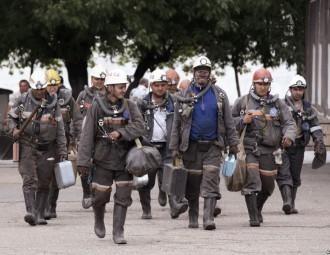Leanid Zlotnikau: For Russia, annexation of Donbas and Lugansk regions is economically unwise
 photo news.vse42.ru
photo news.vse42.ru
Today it is the agricultural Poltava region that adds the biggest earnings to the budget. Donetsk region has long ago turned into a subsidized region and brings more problems than use for the state.
In case Donbas is “federalized” a hundred thousand miners will be left without work. Coal production in Donbas has long ago stopped being profitable for the budget. Because this sector is unprofitable, rent is not paid; vise versa, the state annually spends 12-14 billion grivnas to support coalminers, for the most part making up for the difference between the cost price and the selling price of coal.
It is the government subsidies that are keeping the state coal mines afloat, while Russia stopped backing its coal mining as far back as 2005.
The miners are well aware of that and have already expressed their readiness to protest if the territory of the Eastern Ukraine is annexed by the Russian Federation. As Mykhailo Volynets, the head of the Independent Trade Union of Coal Miners of Ukraine (NPFU), has announced, the question of Donbas’ annexation to Russia absolutely disregards the realms of Ukrainian coal mining.
What economic consequences might the loss of Donbas cause for Ukraine? Who will lose if Donetsk and Lugansk regions will be taken by the Russian Federation after all? Which regions really keep Ukraine alive?
The reporter of the EuroBelarus Information Service talked with with the economist Leanid Zlotnikau about it.
- What will Ukraine lose if Donbas is annexed by Russia?
- It won’t lose anything, it will rather find something. Donbas is mainly dealing with the coal mining, which is being subsidized. In 2013 the subsidies from the state budget made 2.3 billion dollars.
On the whole, in the future Ukraine will mostly live off the agriculture, as it is successfully doing at the moment. Today the biggest income to Ukrainian budget gives the agricultural Poltava region. If we can say so, Ukraine is becoming a world’s breadbasket. That is why I don’t think that from the economical prospective Ukraine would lose a lot if Donbas is separated; however, political and social aspects of that is another story.
- What does Russia, which has stopped supporting its own coal mining, have to do with the Donetsk coal field in case of yet another annexation?
- I think that Russia doesn’t want to annex Donbas, and Donbas will hardly join Russia. First of all, the annexation will result in huge losses for Russia at the international political arena, and secondly, Russia itself is in difficult economic situation now – Russian regions are becoming insolvent. About 60 regions out of 83 are subsidized.
Today Russia is facing the decrease in coal mining. It is expected that Russia will suffer considerable losses in oil and gas income. In the next ten years their export will be reduced and the prices at the world market will be lowered. Thus, Russia has poor perspectives.
- Do economic sanctions of US and EU contribute to the worsening of Russian economy?
- These sanctions are imposed rather as a political instrument and are working indirectly. However, indirect financial measures through the loss of public image are more effective than the sanctions which restrict travel to Europe.
- Does Russia understand that compared with Crimea Donbas is a heavier burden?
- Right, the burden is heavy, and it will be hard for Russia to set Donbas back on its feet, as it is an open question who will replenish the regional budget and pay pensions and salaries to teachers.
If we consider the case of Crimea, it is being subsidized. Russia has to subsidize at least 2.5 billion dollars if it wants to preserve Crimea. Ukraine is regulating water and electricity; there was no regular sowing campaign in Crimea this spring. And because of the notorious events, Crimea will face hardships – there also will be fewer tourists than usually.
All in all, Russia is to have a lot of problems with Crimea.
-
03.01
-
07.10
-
22.09
-
17.08
-
12.08
-
30.09










































